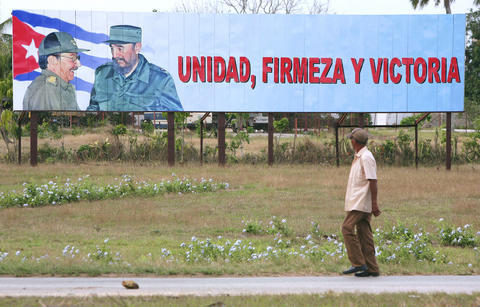Cuba's parliament named Raul Castro president to replace his brother Fidel, prompting a guarded response yesterday from countries looking for signs of reform.
After years in Fidel's charismatic shadow as Cuba's No. 2 and defense minister, Raul Castro faces massive challenges, including preparing the transition of power to a newer generation and reforming the economy.
"Fidel is irreplaceable; the people will continue his work when he is no longer with us physically, though his ideas always will be here," Raul Castro, 76, told lawmakers in his acceptance speech late on Sunday.

PHOTO: AP
In the 19 months since he took over as temporary leader, Raul Castro has made some minor adjustments in the economy, while promising bigger changes.
But he has made it clear that everything will take place "within socialism" and that solutions to the country's problems will come "little by little."
People in the street voiced hopes that the new president would usher in long-sought economic reforms to improve their daily lives.
"This is the best that could have happened to Cuba," Carlos Muguercia, a 78-year-old craftsman said. "Raul already knows the situation. He knows how to solve problems, in any case the most serious ones."
Others were less enthusiastic at the dynastic succession.
"Raul is Fidel without a beard," argued one young man enjoying a beer at a bar in Havana.
In a sign that change may take time, Raul Castro said he would consult with his brother on major issues. And he vowed to be on guard against the US.
"We have taken note of the offensive and openly-meddling declarations by the Empire [as Cuba refers to Washington] and some of its closest allies," he said.
In defiance of US-led calls for democratic reform, Fidel Castro had ruled out any betrayal of the Cuban revolution ahead of Sunday's vote.
In Washington, the top US diplomat for Latin America, Tom Shannon, stressed the "possibility and potential" for change in Cuba, but said it had to come internally.
Shannon also ruled out a lifting of the US embargo imposed on Cuba in 1962 until there was a transition to democracy.
In Brussels, The EU said it was willing to engage in a "constructive political dialogue" with Raul Castro.
Shortly after being named president, Raul Castro named General Julio Casas Regueiro, 72, to replace him as head of the armed forces.
The 614-member assembly also chose the country's first vice president, five other vice presidents, a party secretary and the 23 members of the Council of State.
And in a sign the older generation remained in control, Jose Ramon Machado, another "old guard" Cuban leader, was selected for Cuba's No. 2 spot.
Also see: Raul Castro's lack of magnetism may not be an issue

FALSE DOCUMENTS? Actor William Liao said he was ‘voluntarily cooperating’ with police after a suspect was accused of helping to produce false medical certificates Police yesterday questioned at least six entertainers amid allegations of evasion of compulsory military service, with Lee Chuan (李銓), a member of boy band Choc7 (超克7), and actor Daniel Chen (陳大天) among those summoned. The New Taipei City District Prosecutors’ Office in January launched an investigation into a group that was allegedly helping men dodge compulsory military service using falsified medical documents. Actor Darren Wang (王大陸) has been accused of being one of the group’s clients. As the investigation expanded, investigators at New Taipei City’s Yonghe Precinct said that other entertainers commissioned the group to obtain false documents. The main suspect, a man surnamed

The government is considering polices to increase rental subsidies for people living in social housing who get married and have children, Premier Cho Jung-tai (卓榮泰) said yesterday. During an interview with the Plain Law Movement (法律白話文) podcast, Cho said that housing prices cannot be brought down overnight without affecting banks and mortgages. Therefore, the government is focusing on providing more aid for young people by taking 3 to 5 percent of urban renewal projects and zone expropriations and using that land for social housing, he said. Single people living in social housing who get married and become parents could obtain 50 percent more

DEMOGRAPHICS: Robotics is the most promising answer to looming labor woes, the long-term care system and national contingency response, an official said Taiwan is to launch a five-year plan to boost the robotics industry in a bid to address labor shortages stemming from a declining and aging population, the Executive Yuan said yesterday. The government approved the initiative, dubbed the Smart Robotics Industry Promotion Plan, via executive order, senior officials told a post-Cabinet meeting news conference in Taipei. Taiwan’s population decline would strain the economy and the nation’s ability to care for vulnerable and elderly people, said Peter Hong (洪樂文), who heads the National Science and Technology Council’s (NSTC) Department of Engineering and Technologies. Projections show that the proportion of Taiwanese 65 or older would

Democracies must remain united in the face of a shifting geopolitical landscape, former president Tsai Ing-wen (蔡英文) told the Copenhagen Democracy Summit on Tuesday, while emphasizing the importance of Taiwan’s security to the world. “Taiwan’s security is essential to regional stability and to defending democratic values amid mounting authoritarianism,” Tsai said at the annual forum in the Danish capital. Noting a “new geopolitical landscape” in which global trade and security face “uncertainty and unpredictability,” Tsai said that democracies must remain united and be more committed to building up resilience together in the face of challenges. Resilience “allows us to absorb shocks, adapt under